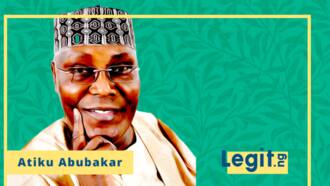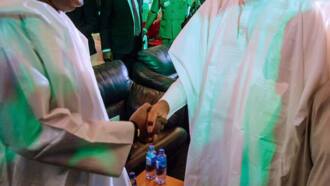Atiku's defeat: 5 key points every Nigerian must note ahead of 2023
On Wednesday, October 30, Nigeria’s 2019 presidential election legal battle came to an abrupt end: the Supreme Court dismissed Atiku Abubakar's petition, and later disclosed the reasons for the ruling.
What are the implications of the apex court's ruling for Nigerian politics? Here are five key points every Nigerian must understand from the ruling:
1. Buhari till 2023, unless there's impeachment
Nigeria's Supreme Court is the final legal institution to seek redress, that is, it's verdict cannot be appealed in any other Nigerian court. Thus, its dismissal of Atiku's appeal means it's the end of the road for the Peoples Democratic Party (PDP)'s presidential candidate: Atiku's not coming.
It's Buhari till 2023 unless he is impeached; a near impossible turn of event, no Nigerian president has been democratically impeached since the country gained independence in 1960.
2. The Supreme Court judgement signifies the official beginning of the 2023 presidential race
Since President Buhari's re-election, the leaders of the ruling All Progressive Congress (APC) have kickstarted the permutations for the 2023 presidency. While some are advocating that power should go to the south in 2023 in line with the country's unofficial zoning principles, some Northern leaders want to retain the Aso Villa seat after the Buhari presidency, and they have their reasons.
However, the PDP had to wait for the Supreme Court verdict before it could start talking about 2023.
With the apex court's verdict, the opposition party can now start permutating for 2023 now; the race has officially begun for the two major parties.
In fact, barely two days after the verdict, Daily Trust reports that some PDP bigwigs, including some state governors, gathered in Abuja to start planning how to field another candidate in 2023.
3. Atiku very likely to contest again in 2023
There is a strong possibility that Atiku will give the presidency another shot in the next elections. He gave the hint in his official statement after the Supreme Court verdict:
Besides, some pundits have argued that Atiku had challenged the election up to the apex court level not necessarily with the sole aim of winning but to keep his political relevance 'alive' till 2023.
His political journey started in 1992 when he announced the bid to contest the presidential election on the platform of the Social Democratic Party (SDP) but later stepped down for Moshood Abiola.
The 2019 attempt was his fifth one, having sought to occupy the Aso Villa seat also in 2007, 2011, and 2015.
4. 2023 will still be between APC and PDP, unless the third force starts acting
There was a spirited attempt to ensure the 2019 elections were not between just two parties, APC and PDP, as it used to be, but it failed; woefully.
Why? Nigerian politics is money-centric, none of the young contenders could match the financial strength of the two dominant parties.

Read also
Dino Melaye moves to get Kogi election cancelled, presents 21 video clips as evidence to INEC (photo)
To break the APC-PDP dominance, the young contenders have to be more organised and engage in a massive re-orientation project.
Yes, to make the Nigerian masses, many of whom are illiterate or semi-literate see beyond the APC and PDP, they need to be reoriented.
Sadly, the youth parties lack organisation and show no signs of readiness to re-orientate the masses.
Or how do you expect the disorganised and scandal-ridden Omoyele Sowore’s African Action Congress (AAC) and Oby Ezekwesili's Allied Congress Party of Nigeria (ACPN) to compete with the moneybags? Or the out-of-touch Young Progressive Party (YPP)?
5. There won't be much difference between 2023 and 2019 elections unless Buhari signs the new amended electoral bill into law
It's unfortunate that 26 years after, the Nigerian presidential election still referenced as the best so far is the annulled 1993 election.
Since returning to democracy in 1999, Nigeria has been struggling to conduct elections that would be accepted by majority as a free and fair one.
This is not to say that the country has not recorded some considerable electoral progress, the successful introduction of card reader for example.
In fact, President Buhari attributed his 2015 victory to the card reader technology which considerably reduced malpractice.
The time is, however, ripe, if not overdue for the country to improve its electoral to address new challenges sprouting up.
It is instructive to note that the eighth National Assembly passed an Electoral Amendment Bill in 2018.
PAY ATTENTION: Install our latest app for Android, read best news on Nigeria’s #1 news app
However, President Buhari refused to assent the bill. In December 2018 when the president refused the bill for the fourth time, he cited the closeness of the 2019 elections as the sole reason for his action.
He said signing a new bill into law when the election was that close could cause crisis.
He gave the lawmakers a condition then that he would sign the bill if they amended it to indicate it would be effective after the 2019 elections.
The bill, however, still remains unassented to.
If President Buhari really wants to leave the legacy of free and fair elections as he has repeatedly promised, he must revisit and assent the bill before 2023.
Otherwise the 2023 elections will still resemble the previous ones.
NAIJ.com (naija.ng) -> Legit.ng. We have upgraded to serve you better
Man vows to vote President Buhari for a third term in office | Legit TV
Source: Legit.ng




